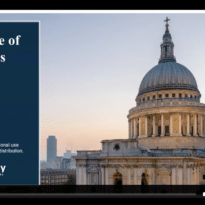UK household wealth across savings, investments and physical possessions has jumped 12% over the last 12 months but six in ten people do not feel financially comfortable, a new report has revealed.
The Financial Health Report from St. James’s Place (SJP) found that over the last 12 months, UK households have seen their wealth rise from £113,154 to £126,483 on average, driven by pay rises (31%), better savings rates (27%) and investment performance (21%). One in six (15%) people have also paid off debts.
Despite this, the cost of living has continued to place strain on people’s financial situations, with 58% admitting they do not feel financially comfortable. A quarter (25%) of people said they feel anxious about the year ahead, with rising energy bills topping the list of concerns, followed by rising food bills and fuel costs.
SJP said that despite the overall average increase in UK wealth over the past year, more people feel worse off (31%) than better off (21%), with 71% of those whose situation has worsened stating that the cost of living has impacted their ability to manage their money.
Those on lower incomes have been hit hardest, with 39% of those earning up to £20,000 reporting that their financial situation has worsened, compared to 22% of those with an income between £40,001 – £60,000 a year and 13% of those earning over £80,000 a year.
It means the wealth divide between those on the lowest and higher incomes stands at £570,864, the wealth management firm said.
The report found that 26% of people do not feel financially resilient and would need their total household wealth to increase by £61,902 to address this, up from £57,317 last year. Three in 10 (31%) people across the UK have less than £10,000 in savings, investments and personal possessions, with 10% having no safety net at all.
SJP said the report highlights the importance of a financial plan to build better financial health. Two fifths (39%) of UK adults have some sort of financial plan in place, increasing to 60% among those who have received some form of financial advice over the last 10 years. Those with a plan are almost £110,000 better off, with average wealth of £191,536 compared to £82,364 amongst households without a plan.
Interestingly, younger generations are more proactive in putting financial plans in place, with under 35s most likely to have a plan (52%), compared to 28% of those over 55. The majority have also taken steps to improve their longer-term finances within the last two years, with 51% reviewing their investments and two thirds (64%) checking for better savings rates.
Alexandra Loydon, director of advice policy & operations at St. James’s Place, said: “The financial health of the nation is clearly a mixed picture. At a headline level, pay rises and better returns on savings and investments have driven an increase in average household wealth this year, but many continue to feel the pinch when it comes to day-to-day expenses. While this naturally impacts those on lower incomes the most, wealth can often be tied up in possessions or longer-term savings, so incomes are being stretched more widely.
“Looking ahead to the rest of the year, consumer confidence is likely to remain fragile as several factors contribute to ongoing financial pressures on households. To navigate this backdrop, it’s crucial that people take steps to make their money work harder.
“It’s great to see the younger generation – who we’ve termed ‘Generation Plan’ – leading the way in this regard, adopting a proactive approach to both short and long-term finances. Building these habits from as early an age as possible, and maintaining them through all stages of life, will stand them in good stead both now and in the future.”
Main image: pawel-czerwinski-yXIKZ5PMqn4-unsplash






























